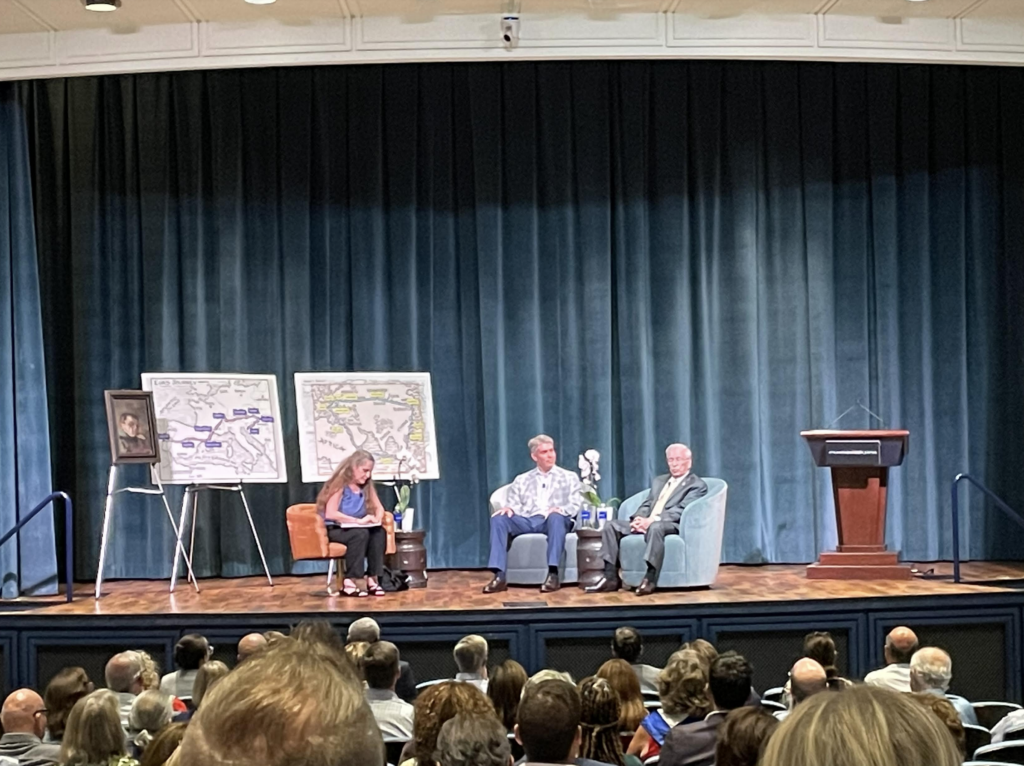The History Center regularly hosts an author talk series, and one recent event was very poignant for me in our historical present: We had the honor of hosting Ted Blum, author of the creative historical nonfiction work Calculated Risks, and Bob Latney, author of From Darkness to Light: My Journey Through Nazism, Fascism, and Communism to Freedom, both of whom offered very personal and historical perspectives.
Each author shared moving stories about their families’ harrowing experiences fleeing Nazi-controlled Europe during and before both world wars, and their dedication and perseverance in tracing their roots added extra depth to the evening.
 Sheffield Hale, president and CEO of the Atlanta History Center;
Sheffield Hale, president and CEO of the Atlanta History Center;
As part of the program, Bremen, a Jewish museum and cultural center in Atlanta, brought a genealogist to the venue to help attendees research their own family history, emphasizing the fact that we are all immigrants with our own unique family histories.
Growing up in Champaign, Illinois, Ted pieced together his story from keepsakes and historical artifacts given to him by his Hungarian grandparents. Inspired by discovering letters, tickets, and artwork while staying at home during the COVID-19 pandemic, Ted took a creative writing course and spent time translating the Hungarian objects with Bob.
His paternal grandfather, Henry, left what Ted calls “the quiet Austro-Hungarian village of Sedliska” to fight and be taken prisoner in World War I. After years in prison and an arduous journey, he finally arrived in New York on September 26, 1921.
 Ted Blum signs books. (Photo courtesy of the Atlanta History Center)
Ted Blum signs books. (Photo courtesy of the Atlanta History Center)
Ted’s maternal grandfather, Martin Mandl, saw the atmosphere in Hungary becoming toxic for Jews as early as 1923, when the country was recovering from the losses of World War I. Martin wanted to escape the country and studied metallurgy at the Sorbonne in Paris. He later met his wife, Elsa, who took a calculated risk and traveled to the United States on a tourist visa, and was fortunate enough to bring his wife and daughter, Eva (Ted’s mother), with him.
Bob’s book is a chronicle of growing up in a war-torn country, from his childhood through his college years in the 1950s. Born in Budapest, Hungary in 1938, the year before Adolf Hitler annexed Austria and Germany invaded Poland, starting World War II, Bob says his childhood was marred by “fear, confusion and loss,” including the loss of his father to Jewish forced labor when he was just four years old. Bob’s mother was sent to a concentration camp in Austria when he was six, “where she was forced to wear a yellow star and live without parents.”
We had the great pleasure of having them speak to us at the History Center about their family’s incredible journey from Europe to America, and we encourage you to read their book and explore your own family stories.
The two authors took different approaches to their family history research. Ted benefited from his family’s meticulous record-keeping, using artifacts and documents to piece together the past. Bob relied on interviews with relatives and his own vivid memories. Their time at the History Center was a profound experience that shed light on the perseverance of the human spirit in times of emotional and physical turmoil.
Special thanks to Maria Saporta of The Saporta Report, who expertly moderated the panel and ensured the authors’ stories were told with heart, clarity and emotion.


